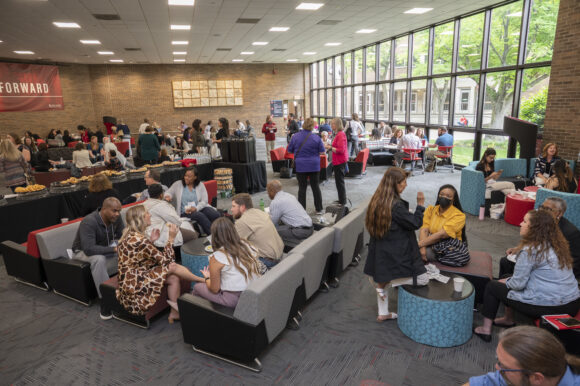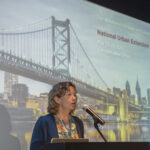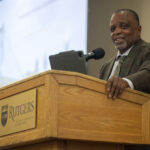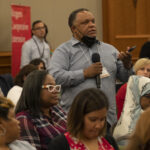2022 National Urban Extension Conference Hosted by Rutgers Offered Opportunity to Inspire and Reconnect

Attendees at 2022 NUEC networking and connecting. Photo: Avi Steinhardt
The National Urban Extension Leaders (NUEL) presented the 2022 National Urban Extension Conference in Camden, NJ, on May 23 -26. The conference, hosted by Rutgers Cooperative Extension and held at the Rutgers Camden Campus Center, attracted 300 participants from over 85 universities, local, state, and federal agencies as well as community groups from New Jersey, New York and Pennsylvania. Held every two years, the Conference provides an opportunity for urban Extension professionals across the nation to connect with colleagues, learn best practices from each other, and share innovative ideas that are making urban communities healthier, more equitable, sustainable and resilient.
This year’s Conference theme, “Reimagining our future…Together,” addressed how to collaboratively strengthen urban communities, protect the environment, improve our health, enrich youth, and feed the future. These topics were cast considering conditions presented during and after the COVID pandemic and in Camden–a city that epitomizes all that is exciting and challenging about urban areas in the Unites States.

Laura Lawson welcomes attendees to the 2022 conference. Photo: Avi Steinhardt
The Program Committee organized an engaging lineup of keynote speakers, oral and lightning presentations, panels, poster sessions, and community site visit tours to Camden, Philadelphia and Trenton. Nyeema Watson, vice chancellor of diversity, inclusion, and civic engagement at Rutgers University–Camden and Laura Lawson, then interim executive dean of the Rutgers School for Environmental and Biological Sciences and interim executive director of the New Jersey Agricultural Experiment Station welcomed attendees to Camden with inspired words that framed Rutgers University as an indispensable partner in the development and well-being of Camden and the State of New Jersey.

MIT professor J. Phillip Thompson was one of the keynote speakers. Photo: Avi Steinhardt
J. Phillip Thompson, Massachusetts Institute of Technology professor and former deputy mayor for strategic policy initiatives for NYC, and Angela Odoms-Young, associate professor and director of the Food and Nutrition Education in Communities Program (FNEC) and New York State Expanded Food and Nutrition Education Program (EFNEP) at Cornell University, delivered riveting keynote speeches that addressed the challenges that universities, state and local governments, private businesses and individuals face as we all work to reimagine the future together.
A rousing keynote address by Darrin Anderson, Sr., CEO of the New Jersey YMCA State Alliance kicked off the Community Connections portion of the conference, a new element introduced this year that focused on practical ways in which Extension services can engage and collaborate more effectively with community groups working on similar urban challenges. Attendees had the opportunity to attend panel discussions by Extension teams or to participate in interactive workshops with representatives from community groups from the Northeast, all of which explored best practices in developing rich, reciprocal relationships with community partners on pressing issues such as urban agriculture or community health.

Participants in a 2022 NUEC plenary session. Photo: Avi Steinhardt
The conference plenary sessions introduced attendees to two new areas of work in NUEL. The first plenary session presented by Marie Ruemenapp and Brent Hales, from Michigan State and Penn State Universities respectively, with contributions from Bill Hoffman, chief of staff to the NIFA acting director, addressed the NUEL and Extension Committee on Organization and Policy (ECOP) work on building the urban aspects of the Climate Extension, Workforce Development, Health Extension, 4-H Positive Youth Development, Urban Ag and Extension, Broadband/Infrastructure (access and literacy) and Diversity, Equity and Inclusion (DEI) Program Action Teams (PAT). The second plenary session presented the new Justice, Equity, Diversity and Inclusion (JEDI) NUEL Action Team and explored ways in which Extension can foster more robust Diversity, Equity and Inclusion (DEI) within Extension teams and programming. Moderated by Craig Taylor from University of Minnesota and including Nia Imani Fields of University of Maryland, Regenea Hurte of Iowa State University, and Durriyyah Kemp of University of Illinois, this poignant session was the first all African-American plenary panel in the history of the National Urban Extension Conference, and offered a frank, practical and touching discussion on how to work together to build a better future for all.
The conference was well received by all who attended, due in no small degree to the support of the Rutgers Cooperative Extension team led by director Brian Schilling; the North East Extension Directors (NEED); conference presenters, organizers and volunteers; Lighthouse Consulting Group, who assisted with logistics and finances; and the Rutgers Office of Urban Extension and Engagement team, who managed the day-to-day aspects of the conference planning and execution.

Attendees at speaker session. Photo: Avi Steinhardt
While the panels, presentations and site visits offered essential takeaways, the in-person element forged valuable connections with colleagues. Rutgers Cooperative Extension Department of Family and Community Health Sciences educator Jennifer Shukaitis commented, “In the Strengthening Communities panel where I presented an example of a successful collaboration with an urban school district, I was able to connect and brainstorm with other urban Extension professionals whom I likely would not have met otherwise. This conference provided a much-needed opportunity to network in person after more than two years of virtual meetings.”
Angela Johnsen, conference coordinator and project coordinator in the Rutgers Office of Urban Extension and Engagement added, “Several attendees who are new to Extension shared with me that because of the conference, they now feel connected with colleagues in their region and across the country and have access to new professional resources. Extensionists who have been coming to the Conference for years shared that they found this year’s program particularly inspiring and are heading home with lots of new ideas to help them in their work serving urban communities. That’s what it’s all about.”

Comments (2)